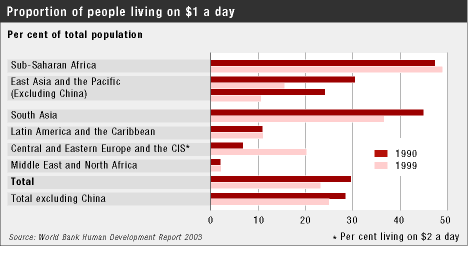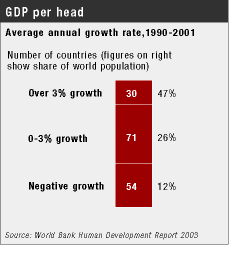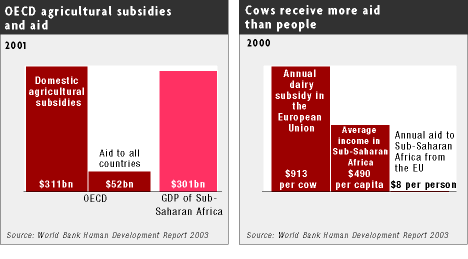The future looks grim
.
By Martin Wolf
Published: July 15 2003 19:38
We
live in a divided world. On one side are the just under 1bn inhabitants of
the high income countries. On the other side are the poor, particularly
the close to 1.2bn people on the margins of subsistence. The average real
incomes of the fortunate are now some 75 times those of the wretched. No
civilised person can disagree that such extreme poverty should be
eliminated.
How to do so is the challenge addressed by this year's Human Development Report.* It contains both good news and bad news. The good news is that over the course of the 1990s, the proportion of the world's population living on the margins of subsistence (on a dollar a day, at purchasing power parity) fell from 30 per cent to 23 per cent (see chart). This progress was driven by the performance of 30 countries whose economies sustained 3 per cent annual growth in real income per head between 1990 and 2001. They contain 47 per cent of the world's population. Foremost is China. Of the 210m decline in the number of extremely poor in east Asia, 150m were Chinese.


The bad news is that 54 countries, with 12 per cent of the world's population, suffered negative economic growth between 1990 and 2001. Another 71 countries, with 26 per cent of the world's population, experienced growth in incomes per head of between zero and 3 per cent a year. Failing countries come into two groups. The temporary group is dominated by a number of countries in transition from communism, particularly in the former Soviet Union. The permanent group is dominated by sub-Saharan Africa. In the 1990s real incomes per head fell at 0.4 per cent a year, on average, in sub-Saharan Africa, while the proportion of the population in desperate poverty rose from 47 per cent to 49 per cent.
Declining standards of living, sustained long enough, also mean declines in other dimensions. Between 1990 and 2001, the under-five mortality rate of sub-Saharan Africa rose from close to 20 times that of the high income countries to more than 25 times. Fourteen sub-Saharan countries experienced declines on the Human Development Index, a weighted average of income per head, life expectancy and education. One reason for these declines is the HIV/Aids catastrophe. The number of cases has reached 42m worldwide. The disease has already killed 22m people and left 13m orphans. In Zimbabwe, life expectancy has fallen by 35 years.
The good news is good: never before have so many experienced so rapid an improvement in their standards of living. But the bad news is appalling: a large number of desperately poor countries are falling further behind.
The Human Development Report's response is to emphasise achievement of the "Millennium Development Goals and Targets", a set of eight goals and 18 targets. These are all intrinsically desirable. They should also help mobilise international support. The approach may be workable in already successful countries with competent governments. But where one is dealing with poor, disadvantaged, ill-governed and already failing countries, a long wish-list is likely to prove too ambitious.
The
overriding priority must be renewed growth. Nothing good can be achieved
in already desperately poor countries if they become still poorer. The
countries failing to grow satisfactorily are mostly dependent on primary
commodities. Many are landlocked. But geography, though important, is not
destiny. As the report notes, "with proper policies, even the difficulties
of small markets - or poor soils, or climatic fluctuations - can be
overcome". If policy matters, so, too, does the quality of government. For
reasons not hard to understand, many of the world's poorest countries are
chronically malgoverned.
The report argues that many countries are now stuck in "poverty traps". The recommendation is for aid to finance investments that these countries cannot fund themselves, so pushing them out of the trap. The priorities, it suggests, are: to make sizeable investments in health, education, nutrition and water and sanitation; raise agricultural productivity; invest in infrastructure; promote industrial development; emphasise equity; and focus on environmental sustainability. The list is moderately persuasive. But more attention should also have been paid to incentives and markets.
Alas, it is hard to be optimistic. True, some sub-Saharan countries have achieved successes in the 1990s: Mozambique and Uganda are examples. But such fragile countries can easily slip backwards. Two decades ago, Ivory Coast was deemed a great success. Today, it is ravaged by civil war.
Yet the effort must be made. As the report argues, there must be an accommodating international environment, with open markets for the exports of developing countries. There has to be more aid, better targeted on the poorest countries, the best performers and the biggest challenges, such as HIV/Aids. Much has been made by critics of the wastefulness of aid. But it cannot be as wasteful as the $311bn poured into assistance to the rich countries' farmers in 2001 (see chart). The report recommends the doubling of aid. Even then, at about $100bn a year, it would only be some 0.4 per cent of the combined gross domestic products of the high income countries.

The policies and institutional environments of the developing countries must also improve. Not too much can be asked: Malawi cannot become Denmark. Where governments are making an effort, assistance must be generous and consistent. It should include comprehensive debt relief.
Eliminating extremes of destitution is the greatest challenge of our age. The millennium development goals should at least concentrate our minds on that task. Progress has been made. But, on current trends, hundreds of millions of people will still be deprived of a minimally bearable existence even half a century from now. If the rich world opens its markets and its wallets, it may not eliminate extremes of misery. If it refuses, it is sure to fail.
Human Development Report 2003: Millennium Development Goals: A compact among nations to end human poverty (New York: Oxford University Press for the United Nations Development Programme)